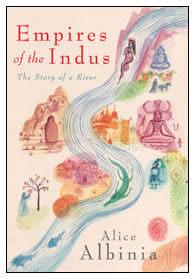EMPIRES OF THE INDUS : THE STORY OF A RIVER - by Alice Albinia
Pages: 366 ISBN-978-0-7195-6003-3 (978-0-7195-6004-0)
Format: hardback / trade paperback
Price: £20 / Rs. 550
Publisher: John Murray, U.K. Empires of the Indus is a comprehensive study of how the river Indus and its waterways have changed the history of the Indian sub-continent. Water is potent: it trickles through human dreams, permeates lives, dictates agriculture, religion and warfare. Ever since Homo sapiens first migrated out of Africa, the Indus has drawn thirsty conquerors to its banks. Some of the world's first cities were built here; India's earliest Sanskrit literature was written about the river; Islam's holy preachers wandered beside these waters. This perhaps captures the essence of this Guardian First Book 2008 awardee, Empires of the Indus , The Story of a River, by Alice Albinia.
Countless annals and travelogues have been inspired by these rough terrains of the North-West, which served as the early roadway for external incursions into India. However few have captured the character of this ancient fertile watershed of River Indus as well as Alice Albinia. Her daring journey along the banks of the river, sometimes through even Taliban exposed regions recreates the historical events of past invaders, religious reformers and "Britain's profit-driven colonization of the lower Indus valley". In a land where it seldom rains, a river is as precious as gold. This reverence for the 'provider' and 'lifeline' is evident in her first-person narrative as she travels through the riverine plains across countries and a timeline of centuries. Beginning at the now almost dried-up mouth of the Indus at Kharochan and Thatta in Pakistan, the book takes the reader "upstream and back in time, from the sea to the source", through Pakistan, Afghanistan and India, "to the time, millions of years ago in Tibet, where the river itself was born". The very name of India comes from the river. The ancient Sanskrit speakers called the Indus 'Sindhu'; the Persians changed the name to 'Hindu'; and the Greeks dropped the 'h' altogether. Moving up the river, along the banks of the various tributaries, Alice perfects her knack for analyzing the hidden facets and discovering relics from the past, even from within her burkha veil. Like the statues of Bamiya Buddhas, that were destroyed by the Taliban subsequent to the author's visit in 2001, the Zindapir's shrine in watery isolation on the smallest of islands at Sukkur or the tomb of Jhulelal, the God of Water. As you turn the pages, you run through the entire gamut of emotions - shock, melancholy, angst and concern, to a sense of wonder. Throughout the book, runs the various manifestations of the river Indus; sometimes as 'Samundar', evocative of the one-time vastness of the river and sometimes as 'Purali' indicating its capriciousness. From the Pashtun 'Nilab' (Blue Water) or 'Sher Darya' (the Lion River) and 'Abbasin' (Father of Rivers) to the Tibetan 'Senge Tsampo' (The Lion River), the Indus is worshiped by peasants and honoured by poets¦and yet today, the mighty Indus of the Sanskrit hymns, the eulogies of Greek soldiers and Sufi saints and source of enlightened Sikh Gurus….. is a diminished river. The author has cleverly weaved in a wealth of oral history into the narratives. Imbued at random with regional flavour and musical overtones, the book has soaked in the genealogy of the social fabric occupying the banks of Indus river. Offering glimpses of time-honoured traditions symbolic of the ethos of that period, Empires of the Indus chronicles all the ethno-diversities that have been a part of the historical developments along this river. Unconquered Sindhu, most efficacious of the efficacious. Speckled like a mare, beautiful as a handsome woman (The RigVeda) Religious hymns and vibrant narratives of the elderly sagacious or the sceptical youth, who guided the author through some dangerous Pashtun lands, lend that element of romanticism and adventure in this river story.
A very down-to-earth lucid presentation, this book is also a critical sociogenic analysis of the factors that have been catalytic in effecting the current political scenario in the sub-continent. Empires of the Indus can be considered a unique study of the socio-political factors that combined with localised problems of an ever-changing river, an inaccessible terrain and parochialist governance, from a historical viewpoint. With a sensitive portrayal of the water problems in Pakistan, to the ramification of damming across even the vastest of rivers and the use of water as a powerful political tool, the author presents the grim facts as a microcosm of the larger picture today. In fact, the book has something for researchers and readers of not just river subjects. The history of the Sheedis and the Bhangis will grab students of sociology. Exploration of the delta that has shrunk from 3,500 sq km to 250, with period-wise and oral documentation will interest advocates of climate change. However some additional inputs about the historical geography attributes of the river would have been valuable add-ons. The book is almost devoid of factual errors, rare indeed when written by an outsider. Thirst for the spirit of an ancient river and its civilisations, supported by excellent research and a non-partisan presentation, is definitely what makes Alicia Albinia stand out as a first-time author. All in all, Empires of the Indus opens up a whole new vista for studies which revolve around a river, from its geological makeovers and historical significance, to the socio-cultural relevance and political nuances typically endemic to a region. This is a must-read, for a rare insight into the role of a river in shaping the future of a sub-continent. More information regarding the Indus River Basin can be accessed on the Portal here: Indus River Basin - Essential Facts
Sangeeta Deogawanka is a freelance journalist, researcher, writer and crusader, who feels passionately about issues and policies surrounding water, climate, food crisis and postal historiography.
